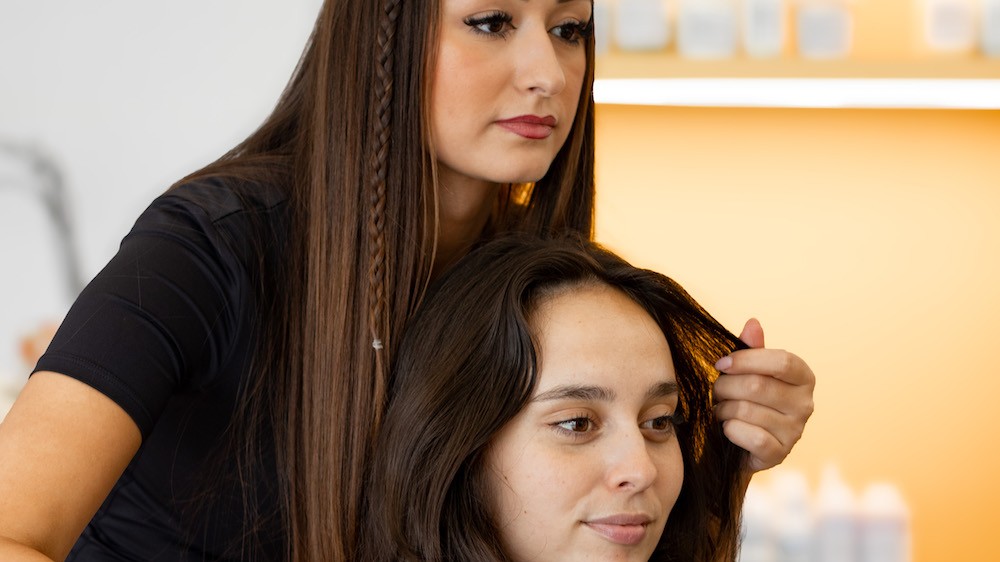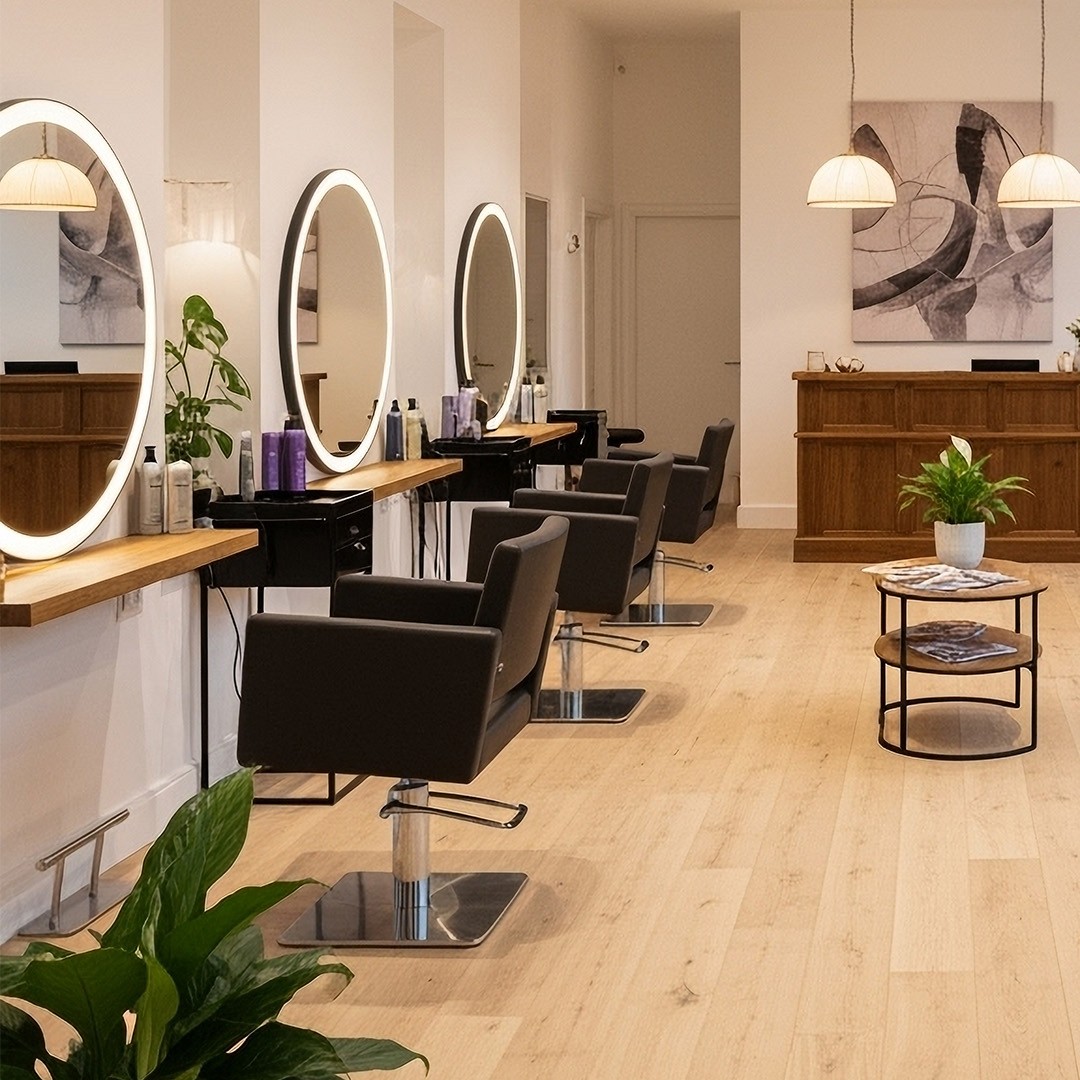If you’re thinking about starting a career as a hairdresser, you've chosen an exciting and creative pathway that can take you all around the world or work around any lifestyle you desire.
HJ is here to support you all of the way. Starting with this guide to everything you need to know about becoming a hairdresser is filled. You'll learn what qualifications you'll need before you can start work behind a chair; the different training options available and what career opportunities there are once you qualify as a hairdresser.
Step One... how do you qualify as a hairdresser in the UK?
What qualifications do I need to train as a hairdresser?
Can I retrain as a hairdresser in later life?
Shall I go to college or do a hairdressing apprenticeship?
How to qualify as a hairdresser
How to build your portfolio
How do you get a job in hairdressing?
What Qualifications Do I Need to Train as a Hairdresser?
To do a level 2 NVQ (national vocational qualification) you need GCSEs in English or Maths (or equivalent qualification) in grades 9 to 3 (or A* to D, if you took them more than a couple of years ago!).
If you're worried about not getting the grades, you can still study functional skills English and maths alongside hairdressing training.
There are no specialist GCSE subject requirements to be a hairdresser, just a willingness to learn and an interest in hairdressing of course!

Can I Retrain As A Hairdresser in Later Life?
If you’re thinking about changing your career to become a hairdresser, know this: it’s never too late!
The hairdressing industry is crying out for confident people, and having the maturity and experience that another career has given you will be seen as a positive for lots of employers and for clients too.
One thing to note is that training costs money, and if you choose to do an apprenticeship these are normally paid minimum wage. It’s likely that you will need to financially support yourself through training, perhaps with another job or savings.
Entry level hairdressing jobs can start from £14,000, with the potential to rise to £30k and beyond as your skills and experience grow.
Many people choose a career in hairdressing as a flexible career option as it means they can balance family commitments and work life.
But bear in mind that hairdressing is a very physical job. You need to be physically fit and healthy as you'll be standing on your feet for most of the day, and blow drying needs strong arms! Salons are often open Saturdays and evenings, so take that into account too.
If you are a freelance or mobile hairdresser, you'll probably have more control over your diary, but you still might find that clients want appointments during evenings or weekends.
Here’s a true story of what it’s like to start a new career in your thirties from Katie Zapletal.
“Every day, we have the privilege of transforming not just hair, but also creating characters, affecting people’s lives, boosting self-esteem and confidence. We hold the power to uplift spirits, foster creativity and create long-lasting connections with our clients.”
Akin Konizi, International Creative Director at HOB Academy and four-time British Hairdresser of the Year winner.
Shall I Go to College or Do a Hairdressing Apprenticeship?
There are so many routes you can take when it comes to training to be a hairdresser. Some quick, and some a bit longer. But learning your craft takes time, you can't rush it!
Some intensive hairdressing courses take as little as six weeks, while others can last up to a year.
Recognised hairdressing qualifications include something called an NVQ (National Vocational Qualification), and they are normally split into the following 'levels'.
Level 1 – An introduction to the basics of hairdressing and salon work. This level gives you in-salon experience and you'll learn shampooing, conditioning and blowdrying.
Level 2 – All the above, plus how to cut hair using basic techniques and optional units like perming, plaiting and twisting hair.
Level 3 – All the above, plus you'll learn how to colour hair using a variety of techniques (think highlights and freehand balayage) and optional units such as colour corrections and learning about the business and financial side of running a salon.
Here's a guide to the skills you'll learn as a hairdressing apprentice.

Many trainees do a hairdressing apprenticeship at a salon. This means you get hands-on experience in a real-life, working salon. You can do an apprenticeship as your sole training, as part of your training or even after your college training. Apprenticeships usually take around 18 months and are always salon-based, you'll work in a salon learning practical skills and gain qualifications through a structured course. Although apprentices receive a salary while they train, this is often the minimum wage.
(PS. You might see the term 'Hairdressing Diploma' instead of NVQ Level used in the UK. The term ‘diploma’ is used as a more general term by some training providers, while an NVQ Level is a more specific UK qualification standard.)
Take a look at our debate on the pros and cons of in-salon, college and academy training.
What Do You Need to Do to Pass a Hairdressing Qualification?
You'll need to improve your hairdressing skills with plenty of hands-on practice whilst training. You'll need to make sure your technical skills top notch, and your interpersonal and social skills are strong too.
NVQs are graded with a system of Pass, Merit and Distinction. Like with most grades, the higher the grade the better it looks to a future employee.
But you will also probably have to undergo a practical test and interview for a hairdressing job - so making sure you hone your social and practical skills is essential too.

How to Build your Hairdressing Portfolio
To move your career forward, you'll need a hairdressing portfolio. It's proof that you can work with different hair types and textures, create different styles and use all the most in-demand colouring techniques.
If you need help building your portfolio, why not ask friends and family if they'd be willing to be a hair model for you?
In this digital age, it’s important to take videos and photos of your work, including before and after images or videos.
Start to post hair content that you are proud of on social media and build a hair portfolio on platforms such as Instagram and TikTok. Social profiles can help you identify your style and is a great selling point to show to future employers in job interviews. It’s also a live portfolio of your work to show prospective clients.
How to Find a Job in a Hair Salon or Start Your Own Business
Now that you’re trained and have a portfolio bursting with hair work, the next step is to get a job as a hairdresser.
As a starting point, make sure you are checking salons’ websites and social media pages for any job postings. As hairdressing is such a people-focused career, visiting salons in person to ask about job openings is a great idea.
As well as being employed by a salon, there is the option to have a freelance hairdressing career. You can work in a rent-a-chair setting, at a studio or in a home salon.
Mobile hairdressing is another career path you can follow, this means you visit clients in their own homes.
Since Covid-19 the popularity of home hair salons has absolutely boomed, with hairdressers setting up small salons either in their homes or in purpose-built garden studios. There are important rules you need to follow to set up a home studio though, including certain financial regulations and potential planning permissions that need to be in place. One home salon owner shares their 10 top tips here.

What Else Can You Do After Becoming a Hairdresser?
There are so many job roles and opportunities within a salon, from being a colourist to a Salon Manager, just take a look at all of the job roles in a salon here.
But you’ll also find that there are career opportunities in hairdressing outside of the salon too. If you fancy working as a TV and film hair stylist, on a cruise ship, or even as a hairdressing influencer - plus so much more - hairdressing is the career for you.
If you've read this article you can see why being a hairdresser makes for such a great career, but don't forget it takes hard work and lots of enthusiasm too!

Frequently Asked Questions
-
What do hairdressers earn?
-
We’re often asked ‘do hairdressers earn good money?’ and it can vary. According to recruitment website talent.com, the median salary for a hairdresser is £26,000. A salon manager can expect to earn up to £35,000 and top hairdressers in good areas could be seeing double that. But a starting salary can be as low as £11,000 for an apprentice or trainee and £14- £19,000 for a junior stylist.
-
What qualifications do you need to become a hairdresser?
-
Although technically there are no qualifications needed to become a hairdresser, most salons require NVQ Level 2 or 3.
-
How long does it take to become a hairdresser?
-
ou may want to become a hairdresser quickly, but as with all skills you need to run before you can walk. A hairdressing apprenticeship often takes around 18 months.
-
Can you become a self-taught hairdresser?
-
You can start a career in hairdressing without formal qualifications through on-the-job training and hands-on experience. However in a competitive job market it’s likely that salons will prioritise those with formal qualifications over self-taught.
-
Am I too old to become a hairdresser?
-
‘Can I become a hairdresser at 40?’ is often googled, and YES, it’s never too late to train as a hairdresser. It can be a physically demanding job if you are on your feet all day, so make sure you're fit and healthy.
-
What skills do you need for hairdressing?
-
You need technical skills (such as cutting, colouring and styling) and soft skills such as customer care, a listening ear and the ability to stay calm under pressure.
-
Is hairdressing a skill or a talent?
-
Both. Yes technical skills can be taught, but creativity and passion will help you make it as a hairdresser.
-
Why are hairdressers so happy?
-
Hairdressers make people look and feel great and often work in social and supportive places.
Still Need Convincing? These 10 Reasons Might Help
Now you know what it takes, perhaps you're still not sure hairdressing is the right career choice for you. Here are some pretty compelling reasons to choose hair.
1. You can see the world
Hairdressing is a truly global job and as long as you've got your scissors and your comb, you can pretty much work anywhere.
2. You'll always have a job
Even in tough economic times, people need to get their hair cut. In terms of job security, hairdressers and undertakers are pretty much guaranteed a job for life!
3. You can earn good money
Most people get into hairdressing because they love it, but that doesn't mean you shouldn't be earning a good salary at the same time. When you're starting out, it can sometimes seem as though you work very hard - and very long hours - for a relativity small reward. But that's not to say that hairdressing can't be a well-paid career.
4. It's one of the happiest jobs in the world
Hairdressing is routinely voted as one of the happiest jobs in the world, winning votes for job satisfaction, creativity and getting to use your skills every day.
5. There are plenty of opportunities to make a name for yourself
There are loads of competitions in the hairdressing industry to help you make a name for yourself. Whether it's on a local or international scale, there's no shortage of opportunities to compete against your contemporaries and show how good you really are.
6. It can be as flexible as you are
Freelancing is growing in popularity amongst hairdressers and there are lots of different roles within the freelance world. You could work as a mobile going to visit people in their homes, in a salon renting a chair or as a session stylist working on shows and shoots.
7. You meet some amazing people
Whether you're based in the salon or freelancing, hairdressing is one of the most sociable jobs in the world.
8. Employees are willing to invest in your growth
Education is essential at every stage of your hairdressing career and it's one industry where your employees are willing to invest in your growth.
9. There's plenty of variety
There's no such thing as a 9-5 in the hairdressing industry and it's safe to say that no day's the same.
10. You'll develop your interpersonal skills
If you think a hairdressing career starts and end with hair, you're in for a surprise. From client psychology and customer service to time management and balancing your finances, working as a hairdresser will teach you all matter of transferable skills to take out into the world.
Want to know more? Read the full guide to 10 convincing reasons to be a hairdresser here
HJ's Apprentice Week is sponsored by Denman.





